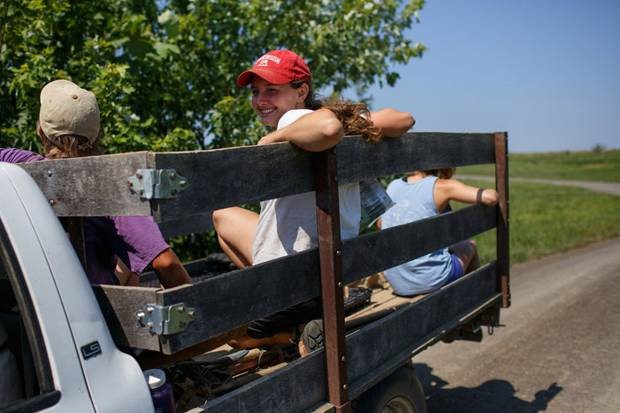Here’s why Dickinson College is one of the greenest colleges in America
 Madison Beehler rides on the back of a truck to get some seedlings that they were transplanting at Dickinson Farm Friday, Aug. 14, 2015. James Robinson, PennLive.com
Madison Beehler rides on the back of a truck to get some seedlings that they were transplanting at Dickinson Farm Friday, Aug. 14, 2015. James Robinson, PennLive.com
James Robinson | jrobinson@pennlive.com
By Rachel Bunn | rbunn@pennlive.com The Patriot-News on August 19, 2015 at 12:30 PM
Tucked away in South Middleton Township people might not know the red barn is one of the many things that is making Dickinson College one of the greenest campuses in the nation.
Sierra magazine, the official magazine of the Sierra Club, ranked Dickinson No. 16 in it’s ninth annual ranking of “Cool Schools,” which rank the greenest colleges and universities in America based on a survey about sustainable campus practices.
Among things looked at by Sierra Club are whether dining halls serve local, organic foods, eco-focused academic courses and whether schools are diverting waste from landfills.
“At Dickinson, we take an approach that’s holistic,” said Neil Leary, director of the center for sustainability education.
Dickinson offers about 120 courses that tie back to sustainability in some way. In a survey of the most recent graduating class, 90 percent had taken at least one course and 50 percent took four or more classes, Leary said. Next year, all students will be required to take a sustainability class.
Dickinson College Focuses On Sustainability Mission With FarmDickinson College Focuses On Sustainability Mission With Farm
Classes range from sciences, like ecology, to sociology to language classes like Spanish. A recent Spanish class looked at food sustainability in Cuba, which included a visit to the country for students.
Students have the opportunity to practice sustainable activities whether it’s working to create renewable energy on campus or being an “eco rep,” where students work within dorms and other campus facilities to encourage things like recycling or energy saving.
Students can also work at The Handlebar, an on-campus bicycle repair shop, where students are given supplies and information about how to do their own bicycle repairs.
Several years ago, students started The Peddler, a student-run coffee cart, using recycled materials. It serves fair-trade coffee, which is also served in the dining hall.
The goal of all the activities is to make environmental awareness a part of the daily lives of those who attend or work at Dickinson.
“How do you live in a day-to-day way and have as light an impact on the environment as possible?” Leary said, explaining.
The central piece of the program is an ultimate goal to make the campus climate neutral — meaning that Dickinson will offset any emissions or waste through other sustainable measures.
“It’s a complicated idea, but the basic idea is we will reduce our emissions by 25 percent and offset the rest by 2020,” Leary said.
“How do you live in a day-to-day way and have as light an impact on the environment as possible?” Neil Leary
There’s one corner of the campus that’s already climate neutral — the campus farm, which is located about 7 miles from campus in South Middleton Township.
The farm, which is USDA-certified organic 50-acre campus, allows students to get hands on experience with farm and renewable energy production among other things.
Buildings are powered using solar panels, and compost from the dining hall is used to not only provide nutrients for crops, but as an ingredient in biogas and biofuel production, said Kaitlin Soriano, an apprentice at the farm.
The biogas production creates methane that is being used in cooking for the apprentices and others who live on the farm, Soriano said. Biodiesel production recently moved to the farm and will eventually integrate into the biogas production since some of the diesel byproduct can be used to create methane.
Though some of the food produced on the farm is sold at the Carlisle Farmer’s Market and is part of the Campus Supported Agriculture program, which provides fresh vegetables to 155 families, most of the food goes back to the Dickinson dining hall and is served to students. About 15 acres of land are used for food production.
“It helps Dickinson students be more connected to their food and the farm,” Soriano said.
Students can volunteer or intern at the farm throughout the school year and over the summer.
The farm also provides opportunities for the recently graduated.
Brendon Murtha, a second-year apprentice, worked on farms in high school and all through his time at Dickinson, but was interested in seeing what an entire year on a farm was like.
“I thought it would be a natural progression,” Murtha said. “The first year apprenticeship is good for learning what happens in fall, but you miss out on what happens in spring.”
Soriano started working on the farm as a college student, and became an apprentice after she graduated in May, living in one of three yurts — a Mongolian-style round tent — located on the farm.
She was interested in seeing what a season on the farm looked like, while also gaining workforce skills.
“It’s helping to improve my management skills,” Soriano said. “And also it’s staying connected to the Carlisle community and Dickinson. It’s just an overall good experience.”